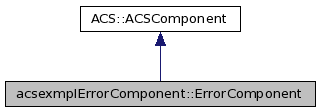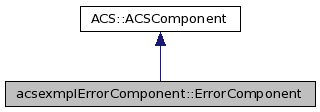import "acsexmplErrorComponent.idl";


Public Member Functions | |
| void | displayMessage () |
| void | badMethod (in short depth) raises (ACSErrTypeCommon::GenericErrorEx, ACSErrTypeCommon::UnexpectedExceptionEx) |
| void | exceptionFromCompletion (in short depth) raises (ACSErrTypeCommon::GenericErrorEx) |
| void | typeException (in short depth) raises (ACSErrTypeCommon::GenericErrorEx, ACSErrTypeCommon::ACSErrTypeCommonEx) |
| void | corbaSystemException () |
| ACSErr::Completion | completionFromException (in short depth) |
| ACSErr::Completion | completionFromCompletion (in short depth) |
| ACSErr::Completion | completionOnStack (in short depth) |
| void | outCompletion (out ACSErr::Completion comp) |
| void | generateSIGFPE (in short way) |
| void | generateSIGSEGV (in short way) |
| void | sleepingCmd (in short nb_seconds) |
Detailed Description
Interface ErrorComponent is used to demonstrate examples of the ACS error system. The methods are thought to produce errors and completions of various types. Implementation and clients demonstrate how to deal with them.
Member Function Documentation
| void acsexmplErrorComponent::ErrorComponent::badMethod | ( | in short | depth | ) | raises (ACSErrTypeCommon::GenericErrorEx, ACSErrTypeCommon::UnexpectedExceptionEx) |
Simple method that throws an ACSException with an error trace of a given depth.
- Parameters:
-
depth depth of the error trace (will be interpreted as 1 if it is < 1). In Java this corresponds to the total number of exception and causing exceptions.
- Returns:
- void
| ACSErr::Completion acsexmplErrorComponent::ErrorComponent::completionFromCompletion | ( | in short | depth | ) |
Simple method that returns an ACSErr::Completion. The Error Trace in the completion is added from a completion.
- Parameters:
-
depth depth of the error trace, if <= 0, returns OK completion
- Returns:
- ACSErr::Completion
| ACSErr::Completion acsexmplErrorComponent::ErrorComponent::completionFromException | ( | in short | depth | ) |
Simple method that returns an ACSErr::Completion. The Error Trace in the completion is added from an exception.
- Parameters:
-
depth depth of the error trace, if <= 0, returns OK completion
- Returns:
- ACSErr::Completion
| ACSErr::Completion acsexmplErrorComponent::ErrorComponent::completionOnStack | ( | in short | depth | ) |
Simple method that returns an ACSErr::Completion. Completion is located on the stack instead on the heap.
- Parameters:
-
depth depth of the error trace, if <= 0, returns OK completion
- Returns:
- ACSErr::Completion
| void acsexmplErrorComponent::ErrorComponent::corbaSystemException | ( | ) |
Method that throws a CORBA::BAD_PARAM system exception to show how to handle CORBA System Exceptions
| void acsexmplErrorComponent::ErrorComponent::displayMessage | ( | ) |
Prints "ErrorComponent" to the console (where the container that activated this component is running).
- Returns:
- void
| void acsexmplErrorComponent::ErrorComponent::exceptionFromCompletion | ( | in short | depth | ) | raises (ACSErrTypeCommon::GenericErrorEx) |
Method that throws an ACSException (ACSErrTypeCommon::GenericErrorEx). The error trace inside the exception is added from a completion.
- Parameters:
-
depth depth of the error trace
- Returns:
- void
| void acsexmplErrorComponent::ErrorComponent::generateSIGFPE | ( | in short | way | ) |
A method which will generate the SIGFPE signal This can be used to test what happens when there is a floating point exception in a component
- Parameters:
-
way parameter used to specify the way to generate the SIGFPE way == 0: Send SIGFPE signal with the kill() function way == 1: Generate a floating point exception by dividing by 0
| void acsexmplErrorComponent::ErrorComponent::generateSIGSEGV | ( | in short | way | ) |
A method which will generate the SIGSEGV signal This can be used to test what happens when there is a segmentation fault in a component
- Parameters:
-
way parameter used to specify the way to generate the SIGSEGV way == 0: Send SIGSEGV signal with the kill() function way == 1: Generate a segmentation fault by accessing to a null pointer
| void acsexmplErrorComponent::ErrorComponent::outCompletion | ( | out ACSErr::Completion | comp | ) |
a Simple method that returns an ACSErr::Completion as an out parameter
- Parameters:
-
comp Completion as out parameter
| void acsexmplErrorComponent::ErrorComponent::sleepingCmd | ( | in short | nb_seconds | ) |
A method that will sleep during nb_seconds seconds before to return This method could be used to test the behavior of components taking a long time before to reply.
- Parameters:
-
nb_seconds the number of seconds to sleep before to return
| void acsexmplErrorComponent::ErrorComponent::typeException | ( | in short | depth | ) | raises (ACSErrTypeCommon::GenericErrorEx, ACSErrTypeCommon::ACSErrTypeCommonEx) |
Method that throws an ACSException on the type level (ACSErrTypeCommon::ACSErrTypeCommonEx). Since we do not have hierarchy in IDL, we have to specify here code and type exception. This means that this method can throw GenericErrorEx but also any exception in the ACSErrTypeCommonEx type.
- Parameters:
-
depth depth of the error trace
- Returns:
- void
The documentation for this interface was generated from the following file:
 1.7.0
1.7.0